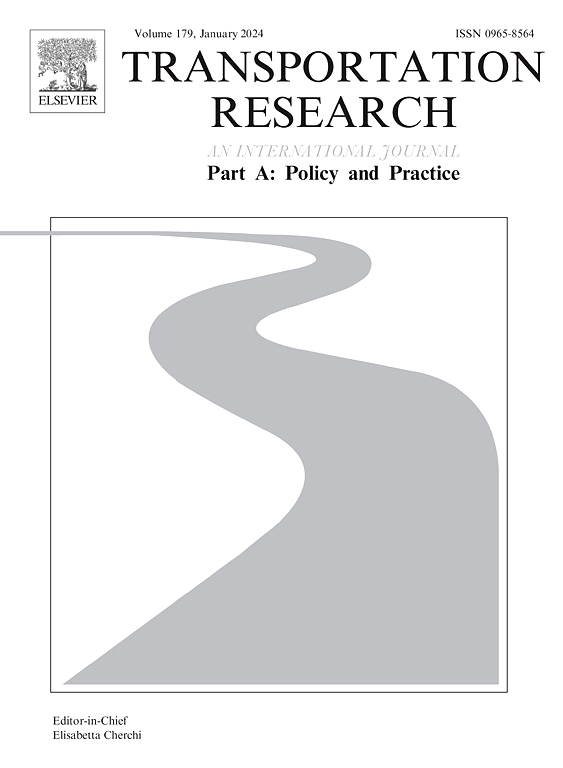Choosing a flat rate over a pay-per-use tariff for public transport: Do psychological factors matter?
IF 6.3
1区 工程技术
Q1 ECONOMICS
Transportation Research Part A-Policy and Practice
Pub Date : 2024-10-11
DOI:10.1016/j.tra.2024.104247
引用次数: 0
Abstract
We investigate the relationship between various psychological factors (taximeter effect, flexibility effect, cost control effect, pre-commitment effect), annual distance traveled, and public transport tariff preferences (pay-per-use vs. flat rate). While a pay-per-use tariff entails ticket prices depending on usage intensity, a flat rate involves an annual public transport subscription covering all journeys within a year. Drawing from a sample of 3,381 Swiss public transport customers utilizing either the pay-per-use option or holding a flat-rate subscription, a binomial logistic regression highlights that the number of passenger kilometers traveled (pkm) predominantly influences the choice of a flat rate. However, the examined psychological factors also significantly shape decision-making. Notably, these effects vary based on the quantity of the product consumed. Specifically, both the taximeter and cost-control effects tend to increase with pkm. Conducting a simulation using binomial logistic regression, we illustrate how different psychological factors are related to the likelihood of opting for a flat-rate subscription. The findings suggest that the level of importance of the psychological factors are relevant to predict the odds of selecting a flat-rate subscription. Hence, emphasizing product advantages in marketing communications and strategically adjusting product design to leverage these psychological factors emerge as effective strategies for enhancing sales promotion and fostering customer loyalty. These results offer insights into consumer psychology and decision-making within the transportation sector. The implications are particularly valuable for managers aiming to address barriers to public transport use. By strategically refining ticket product ranges, managers can actively contribute to reducing CO2 emissions through induced modal shifts.
公共交通选择统一收费标准还是按次收费标准?心理因素重要吗?
我们研究了各种心理因素(计价器效应、灵活性效应、成本控制效应、预先承诺效应)、年出行距离和公共交通收费偏好(按次付费与统一收费)之间的关系。按次付费的票价取决于使用强度,而统一票价则包括一年内所有行程的公共交通年费。通过对瑞士 3,381 名使用按次付费或统一票价的公共交通用户进行抽样调查,二项逻辑回归结果表明,乘客出行公里数(pkm)对选择统一票价的影响最大。不过,所研究的心理因素也对决策产生了重要影响。值得注意的是,这些影响因消费产品数量而异。具体来说,计价器效应和成本控制效应都会随着乘客千米数的增加而增加。我们利用二叉逻辑回归进行了模拟,说明了不同心理因素与选择统一费率套餐的可能性之间的关系。研究结果表明,心理因素的重要程度与预测选择统一费率套餐的几率有关。因此,在营销传播中强调产品优势并战略性地调整产品设计以利用这些心理因素,是加强销售促进和培养客户忠诚度的有效策略。这些结果提供了对运输业消费者心理和决策的见解。对于旨在解决公共交通使用障碍的管理者来说,这些影响尤为宝贵。通过战略性地完善车票产品系列,管理者可以通过诱导交通方式的转变,为减少二氧化碳排放做出积极贡献。
本文章由计算机程序翻译,如有差异,请以英文原文为准。
求助全文
约1分钟内获得全文
求助全文
来源期刊
CiteScore
13.20
自引率
7.80%
发文量
257
审稿时长
9.8 months
期刊介绍:
Transportation Research: Part A contains papers of general interest in all passenger and freight transportation modes: policy analysis, formulation and evaluation; planning; interaction with the political, socioeconomic and physical environment; design, management and evaluation of transportation systems. Topics are approached from any discipline or perspective: economics, engineering, sociology, psychology, etc. Case studies, survey and expository papers are included, as are articles which contribute to unification of the field, or to an understanding of the comparative aspects of different systems. Papers which assess the scope for technological innovation within a social or political framework are also published. The journal is international, and places equal emphasis on the problems of industrialized and non-industrialized regions.
Part A''s aims and scope are complementary to Transportation Research Part B: Methodological, Part C: Emerging Technologies and Part D: Transport and Environment. Part E: Logistics and Transportation Review. Part F: Traffic Psychology and Behaviour. The complete set forms the most cohesive and comprehensive reference of current research in transportation science.

 求助内容:
求助内容: 应助结果提醒方式:
应助结果提醒方式:


